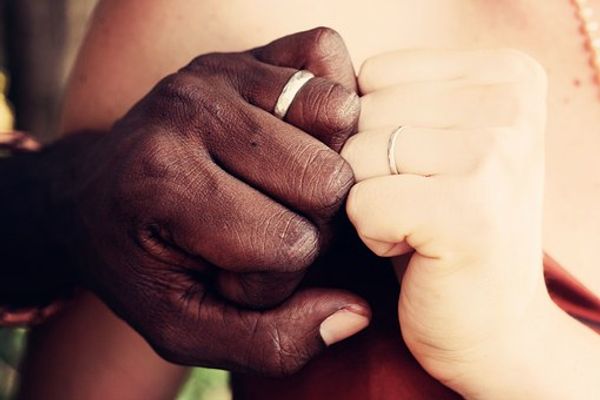4.1.3
Marxist & Feminist Perspectives
The Marxist Perspective
The Marxist Perspective
Marxists see the family as serving the need of a capitalist society where conflict between social classes and opposing interests are part of its framework.


Capitalism
Capitalism
- Marxism sees the family as reproducing, nurturing and maintaining a workforce to support capitalism.
- Althusser views the family as an ideological state apparatus, passing on the acceptance of the ruling class ideology and damping down social conflict.


Inequality
Inequality
- According to Marxists, the family reproduces inequality and the transmission of wealth between generations and through monogamous marriage, keeping the wealth with a small number of families.
- The family provides an escape route and haven from oppression and exploitation at work or, as Zaretsky points out, ‘the family is a private place where workers can be valued as individuals.'


Criticisms of the Marxist perspective
Criticisms of the Marxist perspective
- It’s out-dated, for example, people rarely marry just to pass on wealth to their children.
- The family can be as much of source of conflict as can an escape route; this is particularly true for women.
- Marxists paint a very negative view of family life, arguing that its purpose is simply to produce workers for the dominant ideology, whereas, family life can be harmonious and fulfilling.
Feminist Perspectives: Liberal and Radical
Feminist Perspectives: Liberal and Radical
There are three main types of feminism: liberal, Marxist and Radical, all with a different take on how the family impacts the life of women.


The feminist perspective
The feminist perspective
- Feminism emphasises the patriarchal nature of the family and the harmful effects it has on women’s power, careers and health.


Liberal feminists
Liberal feminists
- Liberal feminists believe that the best way to remedy the adverse effects to women’s careers and power is by reform measures that enable women to make free career choices between motherhood, a career or a combination of both.


Liberal feminist policy
Liberal feminist policy
- This change can take place by, for example:
- Avoiding gender stereotyping during socialisation.
- Implementing laws to establish equal pay.
- Preventing sex discrimination.
- Implementing equality in maternity and paternity leave.


Radical feminists
Radical feminists
- Radical feminists see the family as a patriarchal institution reproducing the inequality of women and benefiting men.
- Men are seen to exercise power and control over women, sometimes supported with physical violence.
- Men are seen to benefit from women’s unpaid domestic labour.


Radical and Marxist
Radical and Marxist
- Like Marxist feminists, radical feminists regard the family as an oppressive institution for women, linked to capitalist exploitation and patriarchy, which needs to be abolished.
Feminist Perspectives: Marxist and Criticisms
Feminist Perspectives: Marxist and Criticisms
There are three main types of feminism: liberal, Marxist and Radical, all with a different take on how the family impacts the life of women.


Marxist feminists
Marxist feminists
- Marxist feminists emphasise the way women are doubly exploited, both as workers in an exploitative capitalist system and as women in a patriarchal society.
- The family is seen as meeting the need of capitalism and exploiting women through a number of pathways...


Capitalism and female exploitation
Capitalism and female exploitation
- Through reproducing the labour force via primary socialisation and unpaid domestic labour.
- Through social control, the demands of supporting a family and buying consumer goods keep people in unsatisfying, boring and unrewarding jobs.


Delphy and Leonard
Delphy and Leonard
- According to Delphy and Leonard, the family acts as a safety valve, in that women provide a sanctuary for male workers through their emotional expressive work, helping to prevent frustration at work spilling over into unrest.


Criticisms of the feminist perspective
Criticisms of the feminist perspective
- Women’s roles are not the same in all families, and today most women are in employment.
- Changes in women’s roles give them more independence within the family.


Criticisms cont.
Criticisms cont.
- Many women can’t be described as victims trapped in oppressive relationships and they have more choice over the roles they take on.
- More women than men initiate divorce.
1Theory & Methods
1.1Sociological Theories
1.2Sociological Methods
2Education with Methods in Context
2.1Role & Function of the Education System
2.2Educational Achievement
2.3Relationships & Processes Within Schools
3Option 1: Culture & Identity
3.1Conceptions of Culture
3.2Identity & Socialisation
3.3Social Identity
3.4Production, Consumption & Globalisation
4Option 1: Families & Households
4.1Families & Households
4.2Changing Patterns
4.3The Symmetrical Family
4.4Children & Childhood
5Option 1: Health
5.1Social Constructions
5.2Social Distribution of Healthcare
5.3Provision & Access to Healthcare
5.4Mental Health
6Option 1: Work, Poverty & Welfare
6.1Poverty & Wealth
7Option 2: Beliefs in Society
7.1Ideology, Science & Religion
7.2Religious Movements
7.3Society & Religion
8Option 2: Global Development
8.1Development, Underdevelopment & Global Inequality
8.2Globalisation & Global Organisations
8.3Aid, Trade, Industrialisation, Urbanisation
9Option 2: The Media
9.1Contemporary Media
9.2Media Representations
10Crime & Deviance
10.1Crime & Society
10.2Social Distribution of Crime
Jump to other topics
1Theory & Methods
1.1Sociological Theories
1.2Sociological Methods
2Education with Methods in Context
2.1Role & Function of the Education System
2.2Educational Achievement
2.3Relationships & Processes Within Schools
3Option 1: Culture & Identity
3.1Conceptions of Culture
3.2Identity & Socialisation
3.3Social Identity
3.4Production, Consumption & Globalisation
4Option 1: Families & Households
4.1Families & Households
4.2Changing Patterns
4.3The Symmetrical Family
4.4Children & Childhood
5Option 1: Health
5.1Social Constructions
5.2Social Distribution of Healthcare
5.3Provision & Access to Healthcare
5.4Mental Health
6Option 1: Work, Poverty & Welfare
6.1Poverty & Wealth
7Option 2: Beliefs in Society
7.1Ideology, Science & Religion
7.2Religious Movements
7.3Society & Religion
8Option 2: Global Development
8.1Development, Underdevelopment & Global Inequality
8.2Globalisation & Global Organisations
8.3Aid, Trade, Industrialisation, Urbanisation
9Option 2: The Media
9.1Contemporary Media
9.2Media Representations
10Crime & Deviance
10.1Crime & Society
10.2Social Distribution of Crime
Unlock your full potential with Seneca Premium
Unlimited access to 10,000+ open-ended exam questions
Mini-mock exams based on your study history
Unlock 800+ premium courses & e-books